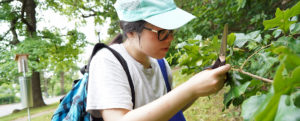From UMW:
To the untrained eye it was just an ordinary leaf, a speck in a mass of summer green on an edge of the University of Mary Washington campus.
But on a hot July morning, biology major Tessa Lanzafame spotted something interesting, a tiny green caterpillar that appeared to be gnawing. With a snip of her scissors, Lanzafame collected the leaf and the insect, then marked the location on a Google map.

It was part of Lanzafame’s summer research with Assistant Professor of Biology Josephine Antwi, one project among 19 conducted during the 2022 UMW Summer Science Institute (SSI). The annual 10-week institute, in which students and faculty collaborate on research, concludes Wednesday, July 20 – with a public symposium.
It’s the 23rd year of the program at Mary Washington. Earlier this summer, UMW introduced the Arts, Humanities and Social Sciences Summer Institute (AHSSSI) inspired by the Summer Science Institute.
Lanzafame, a Suffolk native who will graduate in 2023, has spent many hours scouring campus for larval leaf-chewing or gall-making insects, then monitoring and documenting their maturation in temperature-controlled growth chambers at the Jepson Science Center.
With Antwi, she’s determining the insect species present and their specific plant hosts. She’ll continue the research during the academic year, with the eventual goal of publication.
The chance to publish collaboratively is one part of the appeal to student participants, who are generally asked by faculty to apply for specific SSI projects and who receive a stipend for their work. Just as important is the chance to do meaningful, professional-quality work under scientifically rigorous conditions.
“Internships are nice, but nothing can really teach you as much as doing a project from start to finish,” said Curtis Kasiski ’22, a Woodbridge native who’s working with Antwi to determine the dietary diversity of three species of bumble bees in rural, suburban and urban areas in the Fredericksburg region. “This teaches you so many things you don’t learn in a laboratory setting.”
Other students this summer are conducting similarly challenging and interesting research across a variety of STEM disciplines.
The students who are selected by a panel of judges for the best research presentation and poster will each receive a scholarship award through the John C. and Jerri Barden Perkins ’61 College of Arts and Sciences Student Research Endowment.
This year’s SSI students, their faculty mentors and project titles, are:
- Joon Yi, working with Assistant Professor of Computer Science Jessica Zeitz, “Kinesthetically Teaching Through Computers”
- Shreya Murali, working with Associate Professor of Chemistry Randall Reif, “Investigating Cancer Cell Death by Proton Pump Inhibitors”
- Talia Tanner, working with Assistant Professor of Earth and Environmental Sciences Tyler Frankel, “Assessing the Impacts of Cadmium on the Viability, Locomotor Behavior, and Embryonic Development of the Freshwater Seminole Ramshorn Snail (Planorbella duryi)”
- Jenna Diehl, working with Associate Professor of Mathematics Melody Denhere, “Analyzing Trends in College Majors”
- Jay Boudreau, working with Assistant Professor of Biological Sciences Swati Agrawal, “Fighting Antibiotic Resistance with Phage Therapy”
- Carrie Garvey, working with Associate Professor of Chemistry E. Davis Oldham, “Synthesis of KasA Enzyme Inhibitors to Induce Tuberculosis Cell Death”
- Sean Foley, working with Assistant Professor of Computer Science Veena Ravishankar, “Applying Socket Programming to Battleship”
- Jacob Cantor, working with Assistant Professor of Earth and Environmental Sciences Pamela Grothe, “Calibrating a Multi-Coral Genus Approach for Reconstructing Central Tropical Pacific Climate”
- Lanzafame, working with Antwi, “A Study of Herbivorous Insects and Their Associated Host Plants on the University of Mary Washington Campus”
- Orianne Mbuyi, working with Antwi, “Identification of Fungal Strains on Dead Spotted Lanternfly (Lycorma delicatula): Evidence from DNA Sequencing, Scanning Electron Microscopy, qRT-PCR to Detect Toxin Production, and Laboratory Bioassays”
- Kasiski, working with Antwi, “Determining Dietary Diversity of Bees in the Genus Bombus Along an Urbanization Gradient”
- Stephen McCarthy, working with Ravishankar, “Application of Socket Programming in Video Games”
- Drake Richmond, working with Assistant Professor of Physics Desmond Villalba, “Constraining Potential Dark Matter Candidates from Relic Abundance and Indirect Detection Signatures”
- Ava Spencer, working with Grothe, “Comparing Social and Environmental Vulnerability Indexes to Summer Heat in Fredericksburg, Virginia”
- Lauren Knight, working with Zeitz, “Bridging the Gap Between Motive Motion Tracking Software and the Java Programming Language”
- Carolyn Willmore, working with Frankel, “Assessing the Presence and Concentration of Trace Metals in Banded Killifish (Fundulus diaphanous) and Hydrilla spp. Adjacent to a Virginia Coal Ash Repository”
- Kevin Leong, working with Villalba, “Solar-Powered Phone Charging Stations for the Homeless”
- Karlie Jones, working with Denhere, “The Effect of Covid-19 on the Learning Experience for College Students”
- Aber Gadelrab, working with Assistant Professor of Biology April Wynn, “Pyruvate Decarboxylase 3 (PDC3) Expression and Morphological Measurements of Arabidopsis Thaliana Roots Under Waterlogged-Hypoxic Stress”

























